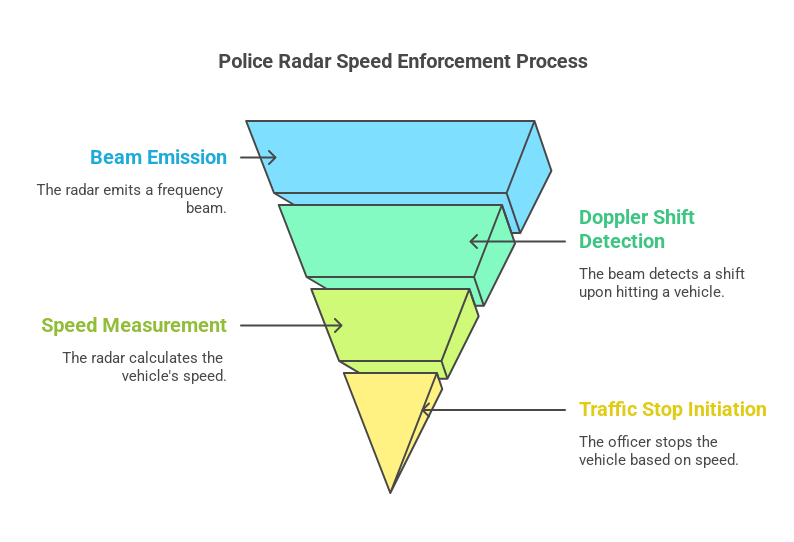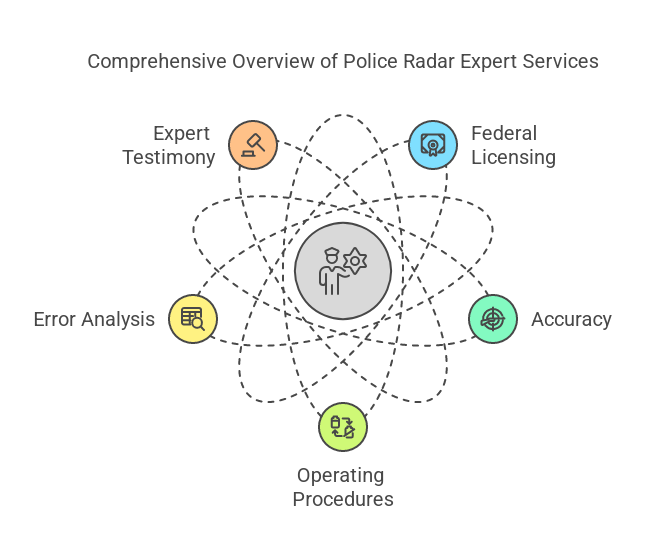Police Radar Speeding Ticket Expert
We can help!
The Offices of Perry J. Zucker, Degreed Engineers, is a widely respected and accomplished forensic engineering firm, established in 1993. Our team comprises skilled professionals, including in-house engineers, technicians, and support staff, who specialize in handling cases related to police radar speeding tickets and violations. We provide expert assistance for probable cause traffic stops and reasonable suspicion traffic stops.
How does Police Radar Works? - Speed Measuring Device
Radar speed measuring devices used for issuing police traffic radar speeding tickets employ an electronic beam that varies in width depending on the radar unit and frequency used.
A police officer, deputy or trooper activates the radar unit, which may consist of either a two-piece or one-piece device, and directs it towards a moving vehicle. The unit emits a beam with a known frequency, which strikes the target and returns to the radar unit with a shift in time or frequency. This theory or phenomenon is referred to as the "Doppler Shift or Frequency". In some cases the shift is digital.
The police officer then observes the target vehicle, typically the defendant in a traffic violation case, and reads the speed measuring device display on the radar unit's LED or LCD readout screen. At some point in time a traffic stop of the target vehicle is made, which is the probable cause traffic stop.

Fight Your Radar Speeding Ticket with Science, Not Just Arguments:
We deliver a comprehensive analysis of complex facts and expert testimony regarding the radar measurement methodology of your speed.
Myth and Reality:
The support of a qualified expert / expert witness provides the technical resources necessary to strengthen your case. We serve as a valuable extension of your legal team, enhancing their overall effectiveness.
Role and Responsibility of the Expert Witness - Engineer
An engineer expert witness (EEW) is an individual who possesses specialized knowledge and expertise in the field of engineering and serves the purpose of enlightening the judicial system, including judges, juries, and lawyers, about the intricate technicalities relevant to their cases. They may be called upon to explicate the applications of scientific principles in particular circumstances, especially in matters concerning laws and regulations. The EEW may offer testimony pertaining to the functionality of police traffic radar speed measuring devices, the topography of specific roadways, and the appropriate usage of such equipment. It is crucial to note that all of our conclusions are derived from evidence-backed data rather than untrustworthy pseudo-science or junk science.
Here are the key responsibilities of an expert witness in such cases:
- Technical Explanation: The expert witness provides a detailed technical explanation of how speed measuring devices (like radar- moving / stationary) operate.
- Accuracy and Reliability: They testify to the accuracy and reliability of the speed measuring device used in the case.
- Training and Certification: The expert witness outlines their own qualifications, training, and certification in using speed measuring devices. This helps establish their credibility in interpreting and presenting technical data to the court.
- Evidence Interpretation: They interpret the data obtained from the speed measuring device and explain its significance to the court. This includes clarifying how the speed measurement was taken, any relevant environmental conditions, and potential factors that may affect accuracy.
- Cross-Examination: During cross-examination, the expert witness defends their testimony against challenges from the defense. They may also address any discrepancies or alternative interpretations of the technical evidence presented.
Overall, the expert witness serves to educate the court on the technical aspects of the case, ensuring that judges and jurors can make informed decisions based on reliable evidence. Their role is critical in providing clarity and impartiality regarding the technical details of speed measurement in the context of speeding tickets or traffic violation cases.
Police Radar Challenges:
Radar devices (Radio Detection and Ranging), including handheld units (such as radar guns) and two-piece systems comprising single or dual antennas and a control head (transmitter and receiver), may encounter various challenges. These can include operational issues, readings, errors, trig problems, and other operational concerns.
Operating Procedure For Police Traffic Radar - Expert Witness:
Most law enforcement officer executes a few tests that can aid the operator in verifying the functionality of the radar unit. It is imperative that they possess the necessary training to operate this device correctly. Additionally, obtaining an accurate history within the vicinity of the reported traffic speeding citation may be necessary.
Positions of Traffic Radar Guns / Devices:
Indeed, police radar guns can be utilized in various positions and angles to measure the speed of moving vehicles. Below is a brief overview discussing how different positions are used:
Parallel to the Road (Stationary Position), Perpendicular to the Road (Stationary Position), and Angled (Moving or Stationary).
In each of these situations, radar guns rely on the Doppler effect, wherein the frequency of the radar waves alters as they reflect off a moving vehicle.
Methods of Police Radar Enforcement Actions:
Catch and Chase:
This task involves the participation of at least two police vehicles. The first police vehicle is stationary and equipped with a radar device, which may consist of either a two-piece set (interior or dual exterior antenna) or a single-piece radar handheld gun. The operator activates the radar device, which detects the speed of the target vehicle, displaying the results on a digital screen. The first police officer then communicates this speed information to another police officer or state trooper (vehicle 2) using a police 2-way radio. Finally, the second police vehicle, which is engaged in pursuit, conducts a traffic stop of the target vehicle. Watch the video >
Blind Spot:
This method involves a stationary police vehicle which could be facing with traffic, or against traffic or perpendicular to traffic and/or roadway. By the time a motorist observed the law enforcement officer, the radar beam is on the target vehicle and a traffic stop is made, shortly thereafter. Watch the video >
What are the different types of police radar - Doppler radar?
Police Stationary Radar:
This situation happens when the police car is stationed at the side of the road, whether parallel or perpendicular, with or without an angle. The radar device is engaged when the vehicle being targeted (yours or the defendant's) is within or close the "Zone of influence" (beam).
Police Moving Radar:
This situation arises when the police vehicle and the vehicle in question (yours / defendant) are in motion. The radar device is activated when the vehicle in question (yours / defendant) is inside or close to the range of detection (beam), sometimes known as the "Zone of Influence". In certain cases, the radar can measure speed in various directions. Police radar operates on different frequencies, which determine the width of the detection range and other relevant factors.
Police Radar Gun Accuracy - For Speed
The accuracy specification level should be maintained within single digits in order to ensure reliable measurements for police traffic radar.
Traffic Radar Marginal / Tolerance Errors?
Inaccuracies may arise in measurements if the radar gun is not correctly operated, aligned, and/or tested.
How to Beat / Fighting a Police Traffic Radar Speeding Ticket - Trial Preparation (Defense)
Review all the document(s) / data records. Police Officers that issue radar speeding tickets / violations are "Experts" in the operation and not the theory of the aforementioned device(s). A good defense, is to retain an "Expert / Expert Witness" in this exact field. The expert should be an engineer, that is familiar with radar speed measuring device (certified speed measuring device operator / instructor), federal licensed radar operator, police training, vehicle characteristics, certified vehicle technician / mechanic, and court rules. Usually trial by declaration (mail) rarely is successful.
Traffic Radar Expert Witness
Police radar speeding ticket expert witness, federal licensed radar operator / trainer, accuracy, operating procedure, errors, expert testimony for stationary / moving radar. Our police radar expert conduct site inspections, analyze all relevant evidence, and offer expert witness testimony regarding disputed police radar speeding tickets or traffic stops based on probable cause. Our services are aimed at ensuring fairness and justice in courtrooms across the country.

Expert Witness Service Locations
Includes the following states: Alabama, Alaska, Arizona, Arkansas, California, Colorado, Connecticut, Delaware, Florida, Georgia, Hawaii, Idaho, Illinois, Indiana, Iowa, Kansas, Kentucky, Louisiana, Maine, Maryland, Massachusetts, Michigan, Minnesota, Mississippi, Missouri, Montana, Nebraska, Nevada, New Hampshire, New Jersey (NJ), New Mexico, New York / NY / New York City / NYC, North Carolina, North Dakota, Ohio, Oklahoma, Oregon, Pennsylvania (PA) , Rhodes Island, South Carolina, South Dakota, Tennessee, Texas, Utah, Vermont, Virginia, Washington, West Virginia, Wisconsin, Wyoming and Canada.
